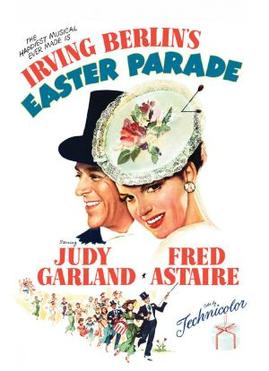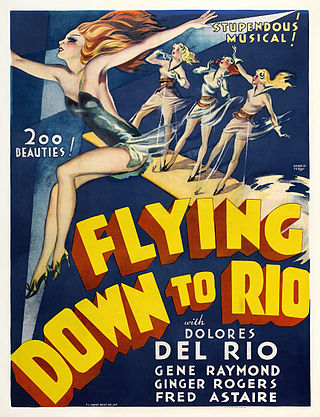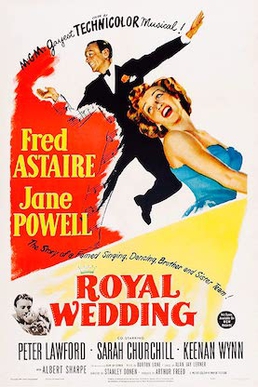Related Research Articles

Ginger Rogers was an American actress, dancer and singer during the Golden Age of Hollywood. She won an Academy Award for Best Actress for her starring role in Kitty Foyle (1940), and performed during the 1930s in RKO's musical films with Fred Astaire. Her career continued on stage, radio and television throughout much of the 20th century.

Fred Astaire was an American dancer, choreographer, actor, and singer. He is often called the "greatest popular-music dancer of all time". He has received numerous accolades including an Honorary Academy Award, three Primetime Emmy Awards, a BAFTA Award, two Golden Globe Awards, and a Grammy Award. He was honored with the Film Society of Lincoln Center tribute in 1973, the Kennedy Center Honors in 1978, and AFI Life Achievement Award in 1980. He was inducted into the Hollywood Walk of Fame in 1960, American Theatre Hall of Fame in 1972, and the Television Hall of Fame in 1989.

The Band Wagon is a 1953 American musical romantic comedy film directed by Vincente Minnelli, starring Fred Astaire and Cyd Charisse. It tells the story of an aging musical star who hopes a Broadway show will restart his career. However, the play's director wants to make it a pretentious retelling of the Faust legend and brings in a prima ballerina who clashes with the star. Along with Singin' in the Rain (1952), it is regarded as one of the finest Metro-Goldwyn-Mayer musicals, although it was a modest box-office success on first release.

Holiday Inn is a 1942 American musical film starring Bing Crosby and Fred Astaire, with Marjorie Reynolds, Virginia Dale, and Walter Abel. It was directed by Mark Sandrich with music by Irving Berlin. The composer wrote twelve songs specifically for the film, the best known being "White Christmas". The film features a complete reuse of the song "Easter Parade", written by Berlin for the 1933 Broadway revue As Thousands Cheer and used as a highlight of the 1948 film Easter Parade, starring Astaire and Judy Garland. The film's choreography was by Danny Dare.

Easter Parade is a 1948 American Technicolor musical film starring Judy Garland, Fred Astaire, Peter Lawford and Ann Miller. The music by Irving Berlin includes some of Astaire and Garland's best-known songs, including "Easter Parade", "Steppin' Out with My Baby", and "We're a Couple of Swells".

Blue Skies is a 1946 American musical comedy film directed by Stuart Heisler and starring Bing Crosby, Fred Astaire, and Joan Caulfield. Based on a story by Irving Berlin, the film is about a dancer who loves a showgirl who loves a compulsive nightclub-opener who can't stay committed to anything in life for very long. Produced by Sol C. Siegel, Blue Skies was filmed in Technicolor and released by Paramount Pictures. The music, lyrics, and story were written by Irving Berlin, with most of the songs recycled from earlier works.

Broadway Melody of 1940 is a 1940 MGM film musical starring Fred Astaire, Eleanor Powell and George Murphy. It was directed by Norman Taurog and features music by Cole Porter, including "Begin the Beguine".

"Night and Day" is a popular song by Cole Porter that was written for the 1932 musical Gay Divorce. It is perhaps Porter's most popular contribution to the Great American Songbook and has been recorded by dozens of musicians. NPR says "within three months of the show's opening, more than 30 artists had recorded the song."

"One for My Baby (and One More for the Road)" is a hit song written by Harold Arlen and Johnny Mercer for the movie musical The Sky's the Limit (1943) and first performed in the film by Fred Astaire.

Flying Down to Rio is a 1933 American pre-Code RKO musical film famous for being the first screen pairing of Fred Astaire and Ginger Rogers, although Dolores del Río and Gene Raymond received top billing and the leading roles. Among the featured players are Franklin Pangborn and Eric Blore. The songs in the film were written by Vincent Youmans (music), Gus Kahn and Edward Eliscu (lyrics), with musical direction and additional music by Max Steiner. During the initial year that a Best Original Song was given during 7th Academy Awards, the film obtained a nomination for MUSIC (Song) – "Carioca," Music by Vincent Youmans; Lyrics by Edward Eliscu and Gus Kahn [came in 3rd]. Ironically, the song lost to "The Continental" from The Gay Divorcee, the subsequent film of Fred Astaire and Ginger Rogers after Flying Down to Rio.

Royal Wedding is a 1951 American musical comedy film directed by Stanley Donen, and starring Fred Astaire and Jane Powell, with music by Burton Lane and lyrics by Alan Jay Lerner. Set in 1947 London at the time of the wedding of Princess Elizabeth and Philip Mountbatten, the film follows an American brother-sister song and dance duo who, while performing, each fall in love–he, with a female dancer, and she, with an impoverished but well-connected nobleman. The film marked Donen's second directorial feature. It was released as Wedding Bells in the United Kingdom.

Second Chorus is a 1940 Hollywood musical comedy film starring Paulette Goddard and Fred Astaire and featuring Artie Shaw, Burgess Meredith and Charles Butterworth, with music by Artie Shaw, Bernie Hanighen and Hal Borne, and lyrics by Johnny Mercer. The film was directed by H. C. Potter and produced independently for Paramount Pictures by Boris Morros, with associate producers Robert Stillman and (uncredited) Fred Astaire. The film's copyright expired in 1968 and it is now in the public domain.

"A Fine Romance" is a popular song composed by Jerome Kern with lyrics by Dorothy Fields, published in 1936.
"Dancing in the Dark" is a popular American song, with music by Arthur Schwartz and lyrics by Howard Dietz, that was introduced by John Barker with Tilly Losch dancing in the 1931 revue The Band Wagon. The song was first recorded by Bing Crosby on August 19, 1931 with Studio Orchestra directed by Victor Young, staying on the pop charts for six weeks, peaking at #3, and helping to make it a lasting standard.
The 1941 recording by Artie Shaw and His Orchestra earned Shaw one of his eight gold records at the height of the Big Band era of the 1930s and 1940s. Shaw's 1940 arrangement was a collaboration between Shaw and his chief arranger, Lenny Hayton, who was also an important Music Director, Music Arranger and Orchestrator at MGM until 1953.

"Fascinating Rhythm" is a popular song written by George Gershwin in 1924 with lyrics by Ira Gershwin.

Finian's Rainbow is a 1968 musical fantasy film directed by Francis Ford Coppola and starring Fred Astaire and Petula Clark. The screenplay by E.Y. Harburg and Fred Saidy is based on their 1947 stage musical of the same name. An international co-production of Ireland and the United States, the film follows an Irishman and his daughter who steal a leprechaun's magic pot of gold and emigrate to the U.S., where they become involved in a dispute between rural landowners and a greedy, racist U.S. senator.
"Steppin' Out with My Baby" is a popular song written by Irving Berlin and introduced in the 1948 musical film Easter Parade. There it was sung by Fred Astaire as part of a dance number involving Astaire on stairs and three different dance partners.
"Funny Face" is a 1927 song composed by George Gershwin, with lyrics by Ira Gershwin.

"Limehouse Blues" is a popular British song written by the London-based duo of Douglas Furber (lyrics) and Philip Braham (music).
This is a list of Bing Crosby songs he recorded twice or more during his career, excluding all of the 1954 re-recordings for Bing: A Musical Autobiography.
References
- ↑ "Internet Movie Database". imdb.com. Retrieved March 4, 2019.